There are books that do not follow the usual editorial channels, that are underground, poetic, experimental, strange, some are not even books. The small Indómitas fair, within the great Madrid Book Fair, opened its space last year, in the central lane of the event, and this one repeats, bringing together some 45 small and extremely independent publishers, and doubling their participation time, from one weekend to two.
“Our philosophy is to show those publications, assembled magazines, fanzines, object books, that skip the conventional book structure, both in their physical format and in the mode of distribution, through unusual channels,” explains coordinator Pepe Olona. In fact, the requirement to be in Indómitas is to “fail” any of the normal requirements to participate in the Fair. For example, it is necessary not to have a distributor, not to have requested to participate in the Fair or to have been there before; and books without ISBN are accepted (which is the official DNI of the books). That is, artist books, self-publishing, poetic objects… and as far as the imagination goes. There is a lot here.
Olona conceives Indómitas as a derivation of the book fair that began in his long-running POETAS festival, and to which he gives the merit of having reached the great annual book event in Spain. “There are some fairs specialized in this type of publishing, but by being here we managed to expand our audience, and go from a specialized one to a more general one,” she adds. In fact, readers of all kinds swarm along the Paseo de Coches del Retiro, and not only readers, but also walkers and curious people who on their way are exposed for the first time to this type of publications, many times straddling art and literature.
You can find, for example, the editorial laboratory written in pencil, formed by Roberto Equisoain and Desirée Rubio de Marzo. “We make body books,” says the latter, “our pieces are unique, originals or numbered copies and do not have ISBNs. This is the reason why we do not have a traditional distribution channel.” An example is the Red Book, an edition of Mao Tse-Tung’s work designed by Equisoian that looks like a paintbrush: the pages become the handle and the bristles stained with red paint emerge from the spine. The “object of poetic reaction” Uncover Kintsugi (for the Japanese art of repairing ceramics by gluing their fractures), by Rubio de Marzo, consists of pocket calendars from the seventies, with erotic images of women, which recall the Spain that left censorship behind. On them, the artist has embroidered with colored threads to “show the damage that the word does to the female body.” Another curious piece is the universal sash, one that works for any book. “The sash is that uncomfortable thing that everyone hates and in which everyone exaggerates with grandiose phrases, which often have nothing to do with the work they are wearing,” says De Marzo. Thus the reader is forced to enter the territory of the market. “But this universal belt is the reader’s belt.”
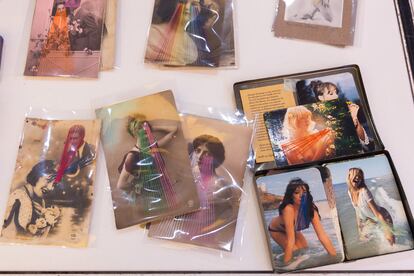
What is an assembled magazine? “They are called in many ways: experimental, assembled, objectual… but I prefer to call them rarewhich anyone understands,” says Pepe Murciego, creator of the now classic magazine The cutest, which celebrates its 30th anniversary (they hand out a postcard with instructions for everyone to celebrate the magazine’s birthday in their own home). They are not magazines with printed pages: they are things. One of its numbers is a box of collected games, another a collection of die-cut maps of Spain, the kind used in schools, another is an apron that keeps a text in each pocket. “Anything can be a page, anything can be a book,” says Murciego.
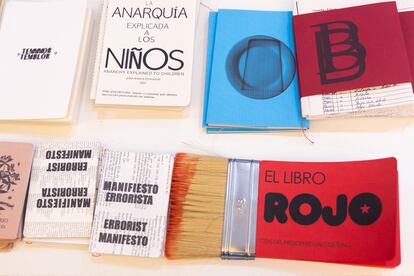
Another magazine of this type is the project The can, formed by Manuela Martínez Romero and Carmen G. Palacios in Albacete, who have been publishing this magazine since 2000, consisting of a can with things inside: small texts and small works of art. “It’s like a portable museum, like a small artistic collection,” says Martínez. They have brought their new number to the fair, the untamed canwhich houses a Poem to be released, by Antonio Gómez, the poem printed on a black stone, which was devised in 1992 and has already been released many times. There are 500 numbered and signed copies. What is this poem launched against? “Against what is necessary,” says the poet, “against everything that deserves i
t.”
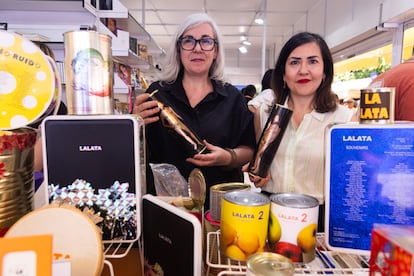
The editorial Eloísa cartonera, who comes from Argentina, has been publishing books made with industrial cardboard from ordinary boxes for more than 20 years. “They are handmade books, made with cardboard from the streets,” says editor María Gómez. “During the crisis at the beginning of the century in Argentina, many people lost their jobs and went out to the streets to collect whatever: cardboard, glass, paper, metal,” she says. From this phenomenon of the cartoneros, together with the effervescent poetic activism and contemporary art, this publishing house emerged, whose philosophy has later spread to different Latin American countries. Each cover has been hand drawn with colorful paint and is unique. Inside there are texts donated by renowned authors such as César Aira, Ricardo Piglia, Fabián Casas or Diana Bellessi, up to more than 200 titles. “We make books with the waste of consumer society,” says Gómez.
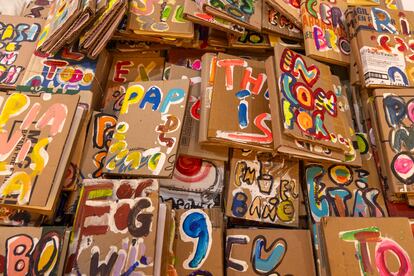
Newbie publishers
In addition to rare publishers, there are also novice publishers at the Fair, participating in the event for the first time. Being at the Fair is no small feat: it provides visibility and maybe, with a little luck and good weather, good income. There are certain requirements regarding the number of titles published, annually and in total, in addition to a financial fee, which means that not everyone can participate, that some publishers have to share a booth and that in some years there have been disputes and controversies to obtain the precious gap.
This year there are 213 publisher booths at the Fair. 159 are from Madrid, and 109 from outside. And of all of them, seven participate for the first time. Among them is, for example, the Catalan Godall Editions. “In addition to our collection in Catalan, we have 40 titles in Spanish, good books, that we want people to know,” explains editor Matilde Martínez Sallés, who shares a booth with the publisher. Bartleby. They also bring “three or four” titles in Catalan, for example, the complete poetry of Mercè Rodoreda or that of Joan Salvat-Papasseit. This year, they have finally gathered the financial strength to pay for the booth and the stay in Madrid for two weeks. They bring a very recent title, so much so that they hope it comes out of print before the Fair ends: the graphic anthology Draw to resist, where different authors express themselves through images against machismo, homophobia and other scourges. “We want to show what we do,” says Martínez Sallés, “and also to create synergies with other editors, share time and information. That is also very important, to recreate that atmosphere of the old markets.”
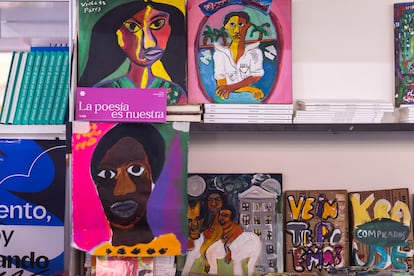
Others that are starting out are Bunker Bookswith headquarters in A Coruña and one leg in Córdoba and another in Madrid, which will give up one of its three meters of booth to another newbie, Obscura Books, specialized in horror and fantasy. “In addition to Bunker Books, the label where we publish international authors such as Phillippe Claudel or Jente Posthuma, we have two other labels, Distrito 93 and Malas Artes, which are like springboard labels,” explains editor Borja F. Caamaño. So they will receive a whopping 34 authors to sign. “Putting it together has been crazy,” he says. The fact of sharing a third of his shed is a good thing to try your luck the first year and see how the
experience turns out. Of the 5,500 euros of expenses that he calculated (3,300 for the booth alone), he is left at half. “In addition, it is essential to have companions in case you have to go to the bathroom, look for change, or simply go out to get some fresh air.”
All the culture that goes with you awaits you here.
Subscribe
Babelia
The literary news analyzed by the best critics in our weekly newsletter
RECEIVE IT
Subscribe to continue reading
Read without limits
_
#Book #Fair #rare #poetic #artifacts #fledgling #publishers